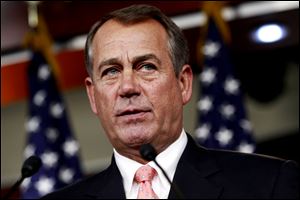
Boehner calls for stronger trade ties to Latin America
5/8/2012
House Speaker John Boehner warned against allowing Iran to make inroads into Latin America and encouraged the U.S. to strengthen trade ties as a bulwark against Iranian influence
WASHINGTON — The U.S. Congress’ top Republican called on Tuesday for deeper economic engagement with Latin America as a bulwark against Iran’s attempt to gain influence in the region and the destabilizing effects of international drug cartels.
“The best defense against an expansion of Iranian influence in Latin America — and against the destructive aspirations of international criminals in the region — is for the United States to double down on a policy of direct engagement,” U.S. House of Representatives Speaker John Boehner, (R., Ohio) said at the State Department.
“We must be clear that we will be there, with our friends and partners in the region, committed to fighting and winning the war for a free, stable, and prosperous hemisphere,” Boehner said in a speech to the Council of Americas, which represents companies that do business in Latin America.
Boehner said Iranian President Mahmoud Ahmadinejad’s visits to Venezuela, Cuba, Nicaragua and Ecuador this year “underscored the designs Iran has for expanding its influence in Latin America, and its eagerness to forge bonds with governments in the Western Hemisphere that have demonstrated a lesser interest in freedom and democracy.”
Iran’s attempt to gain influence was one of three “major threats” facing Latin America, Boehner said, along with the violence caused by drug trafficking and the possibility of the United States losing interest in the region.
“The threat of U.S. disengagement is the most serious of the three threats I have identified because if it occurs, the other two threats will multiply exponentially,” he said.
Boehner called for a re-energized “Plan Colombia” program, referring to the billions of dollars in military aid the United States has poured into the country.
“Colombia still has the second largest insurgency in the world, and we need to take seriously the threat it still poses to the people of Colombia and to the region,” he said.
Boehner received an award from the group for his work last year on winning congressional approval of free trade agreements with Colombia, Panama and South Korea.
The pacts were negotiated during the Republican administration of President George W. Bush.
But President Barack Obama, a Democrat, did not submit the agreements to Congress until October 2011, after negotiating changes to make them more palatable to Democrats and securing a commitment for renewal of a worker retraining program known as trade adjustment assistance.
Boehner called the upcoming entry-into-force of the U.S-Colombia agreement on May 15 “an important moment for the prosperity” of the Western Hemisphere and said it was vital the Panama agreement be fully implemented in the months ahead.
He said it was important the United States “keep the momentum going” by negotiating new agreements to open markets to American exports. He expressed disappointment that Obama has not sought legislation known as “Trade Promotion Authority” which would help the White House do that.
In an apparent reference to Argentina’s expropriation of Spanish oil giant Repsol’s subsidiary YPF and the billions in unpaid debt obligations the country still owes foreign investors, Boehner said the United States “must also be clear about what we expect from all of our neighbors.”
“We will insist that every nation honor the rule of law, meet its obligations, and respect international norms. That means paying debts to bondholders, honoring legal commitments and the decisions made by international arbiters, and respecting private property,” he said.
“Some governments in the region have demonstrated an alarming willingness to drift away from such norms when it suits their objectives. When this occurs, it’s harmful not only to the people of those countries, but to the potential of all of the Americas. And it cannot be excused.”